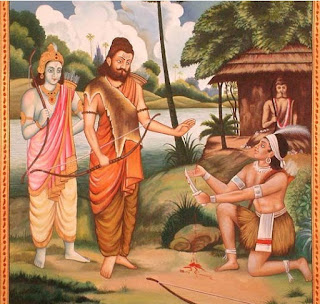Govinda looked down upon the scenes unfolding
below. He had to admire his cousin’s tenacity. He doubted if any of the Kuru
princes would have had the guts to do that. The thought struck him that both of
them, princes in their own right, standing in front of each other, were in fact
third cousins, through him, though neither knew that.
----------------X----------------
His hand still bleeding, he looked at his future
fallen carelessly by the side. The severed thumb seemed to be mocking at him.
He was still in a state of shock. He was now wondering if his courage was
nothing but foolhardiness. Which archer would give their right thumb willingly?
But then for that matter, which guru would ask for such a heinous
guru-dakshina? All to save the ego of a
Kuru prince?
He had glanced at Drona, looking straight into his
eyes, when the request was made. His face betraying none of the emotions he
felt underneath, he had calmly taken his hunting knife, severed his thumb in
one clean movement and laid it at his guru’s feet. He thought he had discerned
a gleam in Drona’s eyes - regret, guilt, relief? He would never know.
-----------------X-----------------
Govinda climbed down from his perch. He walked
over to the boy, still in shock. He sat by his side in a comradely way and
touched his shoulder. Ekalavya looked up at this newcomer. His touch felt a tad
familiar, like a long-forgotten memory.
They both sat in silence for some time, at the end
of which, Govinda got up. He looked at Ekalavya and said, “You may not know this.
But we are related. Your birth father, Devashraya, is my uncle. You got lost
when you were young, just a mere boy, when a hunting trip went awry. I know
now, that your father is the King of Nishadas, Hiranyadhanush and you are very
happy with him. Your fathers, both of them, would be proud of you. As for
whatever happened now, think of it as being for the greater good.”
Saying so, Govinda smiled enigmatically and walked
away.
Ekalavya, glanced at the retreating figure. He had
known about his adoption, but things were a lot clearer now. However, in place
of those cleared questions, more perturbing ones arose.
Why did this have to happen? What would he do now? How would he shoot
again? What would happen to his lifelong dream? A feeling of resentment coupled
with anger took over. Wasn’t he also a prince in his own might? And by this
stranger, who said they were related, wasn’t he again a prince of the Yadava
clan? How could he be differentiated so?
This wasn’t fair at all.
He sat there in the dark, trying to figure out and
make sense of his thoughts and feelings.
At dawn, he got up, shook the caked dirt off his
clothes, and in a resolute manner, walked towards his home.
-------------------------x--------------------
Drona was disconcerted. He couldn’t believe what
he had asked, or why he had asked that. Surely there was a better way he could
have dealt the entire thing with. It was almost as if his mind was controlled
by someone, when he said those darned words. How could he as a teacher have said
something to that effect, even if he hadn’t taught the boy himself? And he
couldn’t believe the fearlessness of the Nishada boy. How could he had have
just severed his thumb like that? What was the matter with him? Didn’t he know he would never be able to shoot
again? Yes, he had turned the boy down when he had come to him with a request
to accept him as a disciple. His hands were full enough with the Kuru princes,
and the boy belonged to a lower caste. The rules of the kingdom wouldn’t have
allowed Drona to teach him.
But of what point was all this now?
The boy had retreated willingly enough,
understanding in his face and sorrow in his eyes at being turned down. However,
who in their wildest dreams would have thought that the boy would practice in a
front a statue in Drona’s form, revering him as his guru and with no proper
guidance still best all the disciples Drona had ever taught.
Something shook him out of his reverie. He looked
around and saw nothing. Still disturbed, he turned back to his thoughts.
And as if earlier, as in the forest, he heard
himself say, “it was necessary. For the greater good.”
--------------X-----------
(to be continued)




